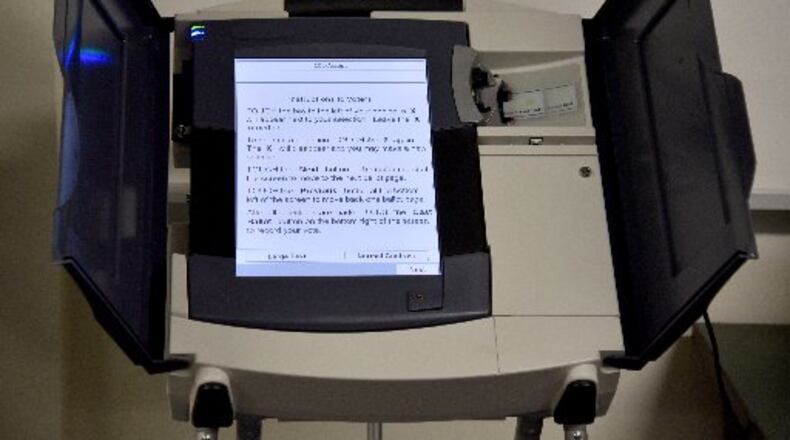46 days until vote
Friday marks 46 days until Americans vote in federal and state races on Nov. 8. All year, The Atlanta Journal-Constitution has brought you the key moments in those races, and it will continue to cover the campaign's main events, examine the issues and analyze candidates' finance reports until the last ballot is counted. You can follow the developments on the AJC's politics page at http://www.myajc.com/s/news/georgia-politics/ and in the Political Insider blog at http://www.myajc.com/s/news/political-insider/. You can also track our coverage on Twitter at https://twitter.com/GAPoliticsNews or Facebook at https://facebook.com/gapoliticsnewsnow.
The email popped into Georgia Elections Director Chris Harvey’s in-box one Monday morning in August, with four sparse lines punctuated by a smiley face and a YouTube link.
“I know you have been asked,” Columbia County Elections Director Nancy Gay wrote of the video, which poll workers, the public and elections officials alike had shared over fears it meant trouble for the November election. “I would love to know your response.”
A steady stream of questions about the security of the state's voting systems has come to the Georgia Secretary of State's Office over the past two months, according to a review of records by The Atlanta Journal-Constitution.
That includes the video shared by Gay on Aug. 22, just days after the FBI’s cyber division warned states that it was investigating incidents related to elections data systems in two states believed to be Arizona and Illinois.
The video shows a snippet from a 2006 documentary called “Hacking Democracy.” In it, a hacker is able to access a voting machine similar to some of those used in Georgia and alter its results. Five days earlier, Cherokee County Elections Director Kim Stancil had sent Harvey the same link.
“Just wanted you to see what some of our poll workers are sending to us,” she told him. “Should we respond at all … what would you like us to say?”
Ballot security has become one of the hottest topics in this presidential election year, stoked by GOP nominee Donald Trump’s claim that he needed his own poll monitors to prevent a “rigged” election in November. The FBI’s announcement came days after Homeland Security Secretary Jeh Johnson hosted a call with elections officials from across the nation about cybersecurity and election infrastructure.
While Georgia officials have sought to assure voters about the measures they have taken to minimize any threat, it’s clearly a worry for some Georgians.
“I’m writing to express my concern about Georgia’s continued use of electronic machines that lack a paper backup,” Decatur resident Jacob Selwood wrote in an Aug. 7 email. “We are one of only five states that still do this. A recent article in Politico pointed to how easy it is to hack the machines that we use, and without a backup paper trail there is no way to tell if that has happened.”
Many of the questions were forwarded to Merle King, the executive director of the Center for Election Systems at Kennesaw State University. The center since 2002 has overseen the state's election operations and voting machines, a job that has spanned three secretaries of state from two political parties.
“Bad science and bad theatre,” King wrote in response to the hacking video, which he said the state had reviewed when it was first released 10 years ago.
In another email, he gave a point-by-point response detailing how the hack was done and which security features in Georgia would prevent it — including physical security features involving the machines themselves and software features that would come into play.
He also hit back over concerns about Georgia’s use of direct-recording electronic voting machines, or DREs, which are known by voters for their touch screens. While the machines do not include a paper trail of recorded votes — something many experts recommend as a safeguard — King said every ballot cast on a DRE can generate “a paper instantiation of the digital ballot.”
“The paper copies could be scanned on a digital scanner or hand counted, if need be,” he wrote, adding that Georgia stood at a 99 percent readiness level ahead of the election. “When activists claim there is not (an) audit trail, that is hyperbole. We have multiple methods of auditing the results of an election.”
About the Author
Keep Reading
The Latest
Featured




